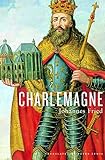Charlemagne /Johannes Fried ; translated by Peter Lewis.
Material type: TextLanguage: English Original language: German Publication details: Cambridge, Massachusetts : Harvard University Press, (c)2016.Description: 1 online resource (xi, 673 pages, 8 unnumbered pages of plates) : illustrations (some color)Content type:
TextLanguage: English Original language: German Publication details: Cambridge, Massachusetts : Harvard University Press, (c)2016.Description: 1 online resource (xi, 673 pages, 8 unnumbered pages of plates) : illustrations (some color)Content type: - text
- computer
- online resource
- 9780674973398
- 9780674973411
- DC73 .C437 2016
- COPYRIGHT NOT covered - Click this link to request copyright permission: https://lib.ciu.edu/copyright-request-form
| Item type | Current library | Collection | Call number | URL | Status | Date due | Barcode | |
|---|---|---|---|---|---|---|---|---|
 Online Book (LOGIN USING YOUR MY CIU LOGIN AND PASSWORD)
Online Book (LOGIN USING YOUR MY CIU LOGIN AND PASSWORD)
|
G. Allen Fleece Library ONLINE | Non-fiction | DC73 (Browse shelf(Opens below)) | Link to resource | Available | ocn959949770 |
Browsing G. Allen Fleece Library shelves, Shelving location: ONLINE, Collection: Non-fiction Close shelf browser (Hides shelf browser)
"This book was originally published as Karl der Grosse (c) Verlag C.H. Beck oHG, Munchen 2013"--Title page verso.
Includes bibliographies and index.
Boyhood -- The Frankish empire and the wider world -- The warring king -- Power structures -- The ruler -- The royal court -- Reviving the title of emperor -- Imperator Augustus -- Epilogue: myths and sainthood.
"When Charlemagne died in 814 CE, he left behind a dominion and a legacy unlike anything seen in Western Europe since the fall of Rome. Distinguished historian and author of The Middle Ages Johannes Fried presents a new biographical study of the legendary Frankish king and emperor, illuminating the life and reign of a ruler who shaped Europe's destiny in ways few figures, before or since, have equaled. Living in an age of faith, Charlemagne was above all a Christian king, Fried says. He made his court in Aix la Chapelle the center of a religious and intellectual renaissance, enlisting the Anglo Saxon scholar Alcuin of York to be his personal tutor, and insisting that monks be literate and versed in rhetoric and logic. He erected a magnificent cathedral in his capital, decorating it lavishly while also dutifully attending Mass every morning and evening. And to an extent greater than any ruler before him, Charlemagne enhanced the papacy's influence, becoming the first king to enact the legal principle that the pope was beyond the reach of temporal justice a decision with fateful consequences for European politics for centuries afterward. Though devout, Charlemagne was not saintly. He was a warrior king, intimately familiar with violence and bloodshed. And he enjoyed worldly pleasures, including physical love. Though there are aspects of his personality we can never know with certainty, Fried paints a compelling portrait of a ruler, a time, and a kingdom that deepens our understanding of the man often called 'the father of Europe'"--Provided by publisher.
COPYRIGHT NOT covered - Click this link to request copyright permission:
There are no comments on this title.







